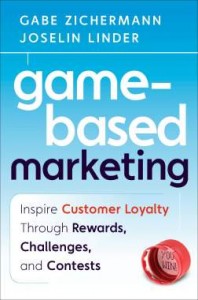 This book had a lot of great points on selling a product through game-based marketing. But, the book was very biased. You could tell the book was written by a gamer, trying to show why games matter in marketing. This would have been a great book if it was written by a marketer, who had a more proven approach. Many of the chapters ended in a “What if…” theory. Everyone has great ideas; but people listen to great ideas with proven results.
This book had a lot of great points on selling a product through game-based marketing. But, the book was very biased. You could tell the book was written by a gamer, trying to show why games matter in marketing. This would have been a great book if it was written by a marketer, who had a more proven approach. Many of the chapters ended in a “What if…” theory. Everyone has great ideas; but people listen to great ideas with proven results.
With that being said, here are some of the better points:
- 1. Games are engaging. They’re social. With so many things to capture attention, games still can cut through the clutter and capture a person’s attention and time.
- 2. Generation G – The greatest game-playing demographic in history. How to market to them? ]
- 3. In order to compete with games, marketing must become a game
- 4. Everyone likes to win (playing games) or they likes to see tense situations (watching games)
- 5. Create a competition in your marketing promotions. This engages.
- 6. Balance long term commitment with the small rewards to keep beginners interested.
- 7. Army example. Built a game around life in the Army. Got more teenagers thinking of enrolling.
- 8. Don’t weight the odds of winning too much
- 9. People will still compete despite not winning money.
- 10. Games of chance will not fare as well as games of achievement
As an example, I recently played the “Loneliest Highway” game, and it worked. I needed to accomplish all objectives (all cities, which I may have not done otherwise) to get a meaningless item (key chain of Highway 50 Survivor). It wasn’t about money. It was about the accomplishment. Grrr… Game mentality.
Types of Gamers
- 1. Achievers – desire to get points, achieve goals and hit their mark. They like winnable games that have an end point. Require an audience to appreciate their accomplishments.
- 2. Socializers – play games in order to connect with others. Less competitive and more cooporative. Love group-play.
- 3. Explorers – Far more interested in mapping out their environment. The richer the world, the better. Prize random puzzles and side stories. All about journey, not destination.
- 4. Killers – Like to win. Enjoy competition and prefer social game environments. They rarely enjoy solitaire. They want win/lose games. And want to win as much as possible.
Components of “Funware”
- Status and Levels – outward display of achievement
- Points – how they’re doing in the game
- Rules – aka structure
- Demonstrability – Showing off
